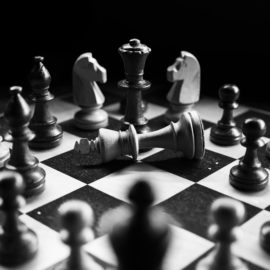

This article is an excerpt from the Shortform book guide to "The Status Game" by Will Storr. Shortform has the world's best summaries and analyses of books you should be reading.
Like this article? Sign up for a free trial here.
What is the outgroup homogeneity effect? Why do cliques and groups form rivalries with one another?
The outgroup homogeneity effect is when members of a group see themselves as unique individuals but believe outsiders are all the same. However, it’s likely that these in-group members aren’t as unique as they think they are.
Below you’ll learn more about the outgroup homogeneity effect, according to The Status Game by Will Storr.
What Is the Outgroup Homogeneity Effect?
Status games go wrong when the natural rivalry between groups becomes too extreme and prejudices us against members of a rival group. We naturally find it uncomfortable to encounter someone whose beliefs contradict ours. But this becomes dangerous when we decide that people who believe differently than we do aren’t just wrong, but morally wrong and therefore evil.
When hostility between groups occurs, we often cease to see members of other groups as unique individuals. Storr explains that instead, we see them as a homogenous group, one that threatens our values and beliefs just by existing and by following different rules than we do. We may even feel justified in attacking others whose beliefs are different from others. This hostility between groups unites people within each group, reinforcing the narrative that group members are heroes fighting for a noble cause and that people outside the group are villains.
(Shortform note: Psychologists have a name for our tendency to view people outside of our group as all the same: the “outgroup homogeneity effect.” When thinking about characteristics like people’s values or personality traits, we tend to judge people from an outgroup (a group to which we don’t belong) as more homogeneous than people from our ingroup (a group to which we do belong). Consequently, we see outgroup members as all the same, rather than as unique individuals. This also makes us more likely to see people from the outgroup in a stereotyped way, which contributes to the hero-villain dynamic Storr describes.)
Status Games Incentivize Conformity
The irony is though, people within groups are rarely individuals. Groups can become oppressive in their control, coercing people to follow their rules and refusing to tolerate those who don’t comply. Storr characterizes tyranny as one of the greatest dangers of status games because it distorts our perception of reality. This particular form of tyranny isn’t one enacted by a single leader: Instead, it’s a “tyranny of cousins,” where the members of the group enforce conformity, sometimes brutally. He says we all have the capacity for tyranny (like when we “cancel” people online for acting in a way that contradicts our beliefs). But by incentivizing us to participate in its cruelty, a tyrannical game clouds our judgment and can lead us to make unethical decisions.
(Shortform note: In The Origins of Political Order, political scientist Francis Fukuyama explains that the phrase “tyranny of cousins” describes how rules were enforced, sometimes violently, when people lived in small bands and their social worlds were limited to kin groups, where the moral rules focused on punishing people who didn’t share with the group. Max Fisher writes in The Chaos Machine that in these consensus-based societies, we learned to respond with moral outrage to someone violating a social norm. But this outrage can spin out of control.)
However, Storr warns, conforming with the group doesn’t always keep us safe. When a game gets more strict and more focused on its rules, even ingroup members come under suspicion. Some people become more strict as the game does. Others lose their faith in the game, but enforce its rules to perform a loyalty that they no longer feel. As people’s doubts about the group grow, they become suspicious of others. The game can then turn into a “witch hunt,” where members hunt down players who are insufficiently loyal to the game.
(Shortform note: Storr’s warning that a game that becomes too strict can devolve into a witch hunt is consistent with research that suggests that witch hunts persecute society’s most marginalized members when they step outside of the roles prescribed for them by strictly enforced rules. Some experts believe that one condition that’s remarkably consistent between historical witch hunts is “a backdrop of social and economic dislocation,” which can lead to stricter rules and growing suspicion. For example, in 16th- and 17th-century Europe, subsistence economies were being replaced by capitalist systems and close-knit communities were breaking down. The resulting conflicts created the conditions for the original witch hunts.)

———End of Preview———
Like what you just read? Read the rest of the world's best book summary and analysis of Will Storr's "The Status Game" at Shortform.
Here's what you'll find in our full The Status Game summary:
- How life is just a game of status and you're a player in it
- How the status game works and what you can do to avoid the toxicity
- What happens when the status games go wrong






